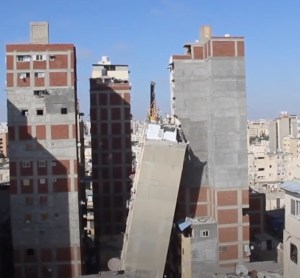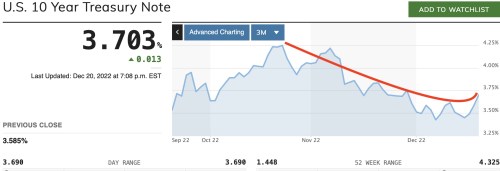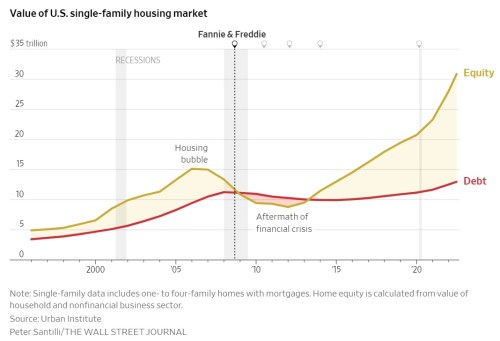This was the year where it seemed everything imploded. For the economy, it started with two quarters of receding GDP that everyone refused to call a recession. Whether you stand with the crowd on that or not, it was certainly not a good change and was certainly a collapse of the economy toward a smaller state based on production. But that was just where it all began. What follows is an amazing overview of a world in a state of collapse.
[Note: If you are a patron of my writing, I have written a much more expanded version of this article for you that contains all the graphs, more supporting facts, and more quotes for all the big events of the year that are stated below. It should have already arrived from Patreon in your email … just like a Christmas present … but early. And thank you for your patronage this year.]
The stock market’s north-pole polar-bear plunge
Right from the start, 2022 became the year the stock market imploded with all major indices down and down … and down some more all year long. So far, this is the year Santa’s slay didn’t soar into some kind of end-of year rally. Instead, the Grinch stole the slay and just went down the hills and through the snow like sleds are supposed to go.
The Grinchy Dow started bounding down the mountainside at the top of year in an endless series of leaps off bluffs and is currently down 11% for the year. At its lowest point of the year, it fell 22% into a full bear market that it remains mired in.
The S&P also started going downhill at the top of the year; but it ran down in front of the Grinch like his dog, trying to keep the Dow from hitting him in the butt, to where the S&P is currently down 20% from its all-time high. At its lowest point it fell 25% from its peak.
The Nasdaq took the worst ride of all. Instead of sliding down like the Grinch’s sled or running for its life to keep from getting ploughed over like his dog, it rolled all the way down like a growing snowball. It got an early lead in November of last year and is currently down 34%! At its nadir, it was down 36%!
As a symbol of this year’s hard times where the FAANG stocks that were the market leaders for a decade got their chops busted, Amazon became the first corporation in history to lose over a trillion dollars in market value. As a scale for the impact of this market collapse of overhyped valuations, that is a lot of zeroes: $1,000,000,000,000. In aggregate, technology companies have lost nearly $5-trillion this year.
Media … has been among the hardest-hit sectors in what is set to be the worst year for global equities since the financial crisis. “It’s been a perfect storm of bad news,” said Michael Nathanson, media analyst at SVB MoffettNathanson. “I’ve been covering this sector a long time and I’ve never seen such a bad collection of data points before.”
No Christmas bond bons for you
2022 was also the year of the bond market nearly froze up at times and experienced its greatest implosion on record, depending on what part of the bond market you are looking at. For real performance on US Treasuries, it was the worst ever (meaning once inflation is factored in).
Morningstar called it,
The Worst Bond Market Ever
Among fixed-income securities, there has been no refuge. Interest rates have spiked across the yield curve, thereby sinking all investment-grade debt. Lower-quality notes have also struggled. Sometimes when interest rates rise, junk bonds perform well, because credit spreads tighten. Not this year. Instead, credit spreads have widened owing to fears of a recession. The result has been comprehensive bond market losses….
Corporate bonds were also just reported on Monday as being on pace for their worst year in history:
Corporate bonds on pace for worst year in history with negative 14% yield
The largest portion of the roughly $10 trillion US corporate bond market looks set to cement its worst year ever by a long shot.
Investment-grade corporate bonds, a longtime source of funding for the world’s largest companies, were set for [a plunge from] zero [to] -14% total returns in 2022, “a level that would mark the second biggest decline on record since 1974….”
And the year ain’t over yet. As laid out in an article in Tuesday’s Daily Doom, Japan just accelerated global bond yields, US included, back into a worse trajectory (of yields jumping up, prices falling). It has been the last bank to join the rate-hike Polar Express to the North Pole, but jumped on board unexpectedly.
With the exception of Japan’s boost during this rising week of yields, the US bond market, usually the wiser of the two markets (stocks and bonds) doesn’t appear, given its recently falling rate path, to believe the Fed is going to keep raising its target rates, which would send bond rates higher. The bond market seems to have bought the pivot narrative, but I think the bond market is as wrong as stocks. Bond yields have generally been falling for two months as if inflation is about to drop off a cliff. Maybe they got the memo this week, given the toboggan-shaped turn they appear to have just put in:
High-yield corporate bond rates spent the whole year climbing until October, and you can see they never quite reached the level of major trouble in the past
However, you can also see yields can spike abruptly upward when a crisis suddenly emerges, and we have just entered the phase where the Fed said at its last meeting that its interest policy has finally hit a level it would call “restrictive” and that it plans to go higher for longer. So, we have just moved into the financial tightening phase where breakage happens.
All-in-all, a very bad year for stocks and bonds together.
The snow-job labor implosion
The biggest implosion surprise of the year (for many) came when job market imploded in a single day … at least from what people believed the truth was about jobs to what was revealed … but few there are who have accepted the Fed’s revelation. As mentioned in an earlier article, while the government reported something like 2.5-million jobs were created from March to the present, as it sang all year about the astoundingly merry jobs market, it turned out the real number was about 12,000, which on the scale of the US job market, is virtually nothing at all.
That’s right: no jobs added from March to the present.
Since 2.5-million would have been a good year, 12k was an overnight implosion of realization (if you got the very hushed memo); yet, the Fed is telling you it wants to tighten down on that considerably more. That ought to drive us deeper into the snow bank and possibly even send inflation back up for an unbridled stagflation recession if the further reduction in jobs further reduces production (thereby further increasing shortages) faster than the Fed’s reduction in money supply takes the pressure off prices. (Remember, the recipe for hot inflation is too much money chasing too few goods.)
The Great Crypto Collapse
2022 was also the year the worlds growing colossus of crypto currencies imploded. (Is this year starting to sound like the Everything Bubble Bust that I laid out in several extensive articles for patrons at the top of the year?).
Many cryptos are down 50-90%….
Bitcoin, the crypto king, is only down 64% from where it started the year. It was at one point, however, down 80% from its all-time high!
Even the misnomered stablecoin destabilized. So the center-less world of decentralized finance didn’t hold. Centrifugal force won the day.
The loss of coinage value, though, was far from the only damage in DeFi. There was also that whole cryptocurrency exchange bust-up where the “banking world,” so to speak, of crypto fell off the back of the sled like Santas sack of packages spilling all the way to where people got froze out of their funds. Witness the now infamous FTX whose nefarious Ponzi pirate, the appropriately named Sam Bankman-Fried (recommend saying it with a snarky long “I”), is sitting in jail awaiting trial because no one trusts him not to run … since he already did to the Bahamas. There is likely to be some serious prison time in that one as he joins the likes of Bernie Madoff and ol’ Charles Ponzi, himself, in penury purgatory.
So, yeah, the crypto crash has been a bone-crushing impact … but what isn’t this year, except cash where your losses have been minimized to about 7-8% due inflation? So, everything is losing. That is what happens when the Fed creates a fake economy built on artificially lowered interest for over a decade and then finally pulls the plug in a year where everything else (droughts, wars, residual plagues, shortages from lockdowns, etc) is going paws-up anyway. If it could go wrong in 2022, it went worse. So, yeah, the Everything Crash, even cash.
Don’t eat the pretty red berries on prickly holly hedge rows
Of course, there were the spectacular hedge-fund flops, too, every bit as flouncy as FTX. I see varied reports that range from 2022 being “a better year than average” for the oft’ beleaguered hedge funds to it being one of the worst. Must be one of those, “depends on who you are talking to” things. If you have lunch with Bloomberg, it was “Hedge-Fund Hell” — a year in which spectacular black swans swooped down like a murder of giant crows. The Financial Times reported in August,
Hedge funds are heading for one of their worst years of performance on record, leaving investors frustrated with how many managers have failed to offset sharp falls in equity and bond markets … on track for [the] second-worst year of returns since 1990.
A falling star from last year — Sung Kook, a.ka. “Bill,” Hwang, head of Archegos Capital Management — was joined this year by another falling star, Cathie Wood, head of that other ARK. Though Archegos defaulted in 2021, Hwang got indicted for federal charges of fraud and racketeering this year; so, Hwang is worthy of a side note for the year as the gift that kept giving. While the financial damage was already set in place, it has continued to play out this year as the dominoes fell.
Big Bill Hwang fell so badly from Archegos $36-billion ivory-wrapped pedestal that he, for all intents and purposes, single-handedly destroyed the venerable Credit Suisse, which spent the whole year in 2022 deeply mired in trouble in large part due to Hwang. Credit Suisse’s board, for example, got sued this year for its Archegos debacle. As recently as October, The Sidney Morning Herald reported.
The board of Credit Suisse is in hot water and unfortunately for it the comparisons with the collapse of Lehman Brothers reflects on the level of fear and doubt surrounding the continued future of the Swiss bank…. In three weeks time, Credit Suisse’s management will update the market on a plan to overhaul the bank and ring-fence its troubled assets. But until then, the rumours of its demise will continue to swirl…
Given the general nervousness of investors, the bond meltdown in the UK, and the general state of the global economy, it’s easy to see why the financial uncertainty enveloping a major European bank is igniting memories of the global financial crisis…. Over the weekend Credit Suisse’s status moved from troubled to dire, in the view of some analysts, as the bank’s board moved to damage control….
Bloomberg News originally reported that Hwang lost $20-billion in 2 days. Ten of the biggest big billion-dollar bills per day; no biggie. So Big Bill Hwang certainly should hang. After all, this wasn’t Big Bill’s first trip down the financial crime-racket path. His former company Tiger Asia Management pled guilty to insider trading of Chinese bank stocks in 2012 and paid a paltry $44 million fine, and he was banned from trading in Hong Kong for an even more paltry four years.
Cathie Wood started as a hedge-fund manager and worked for many hedge funds, but her ship came in with ARK Invest (not a hedge fund), which also nearly stopped floating last year. A rising star early in 2021, Wood’s ARK ETF came in fifth place among Morningstar’s list of top-10 wealth-destroying funds by the end of last year. It started this year down 48%, but ultimately ended down 70% this year from its 2021 pre-collapse peak. That’s a ride that would have made the Grinch’s neck hair stand on end.
Many hedge funds have decided to bet against this former hedge hog’s flagship, but it remains to be seen who will win that bet on what still looks like a race down to The Who’s-Whoville of financial collapse. One of the most famous former hedge-fund managers, Michael “Big Short” Burry, who made billions off the financial crisis during the Great Recession by betting against the housing market, is betting against Wood this time as, he says, an event “defining an era.” Burry’s big bets are known for their successes. In the summer of 2021, he called for this year’s bear market to be “the mother of all crashes,” and Cathie, who had been riding the Big Tech gains that have been crashing this year is far from out of the woods yet.
Another prominent hedge-fund manager warns not so much of problems specific to hedge funds as major problems coming for everyone that he anticipates from his position in hedge row:
Hedge fund Elliott warns of more pain to come after 2022 market rout
The world is on the road to “hyperinflation” and could be heading towards its worst financial crisis since the second world war, according to Elliott Management, one of the world’s biggest and most influential hedge funds….
“Investors should not assume they have ‘seen everything’” ….
The world is “on the path to hyperinflation”, it said, which could lead to “global societal collapse and civil or international strife”. While such an outcome is not certain, this is currently the direction that the world was headed, it added….
There are so many “frightening and seriously negative possibilities” that it is hard not to think that “a seriously adverse unwind of the everything bubble” is coming, it said.
The housing-bubble bust
No Great Collapse would be complete without the collapse of housing all over the world! While the best-known housing collapse was primarily a US phenomenon that spread banking troubles around the world, this year’s housing collapse is a whole bunch of global phenomena, and we, as yet, have little evidence of how much trouble these monstrous bubbles can create around the world.
The following chart will give you some sense of the scale of this housing bubble just in the US versus the last one that was so catastrophic:
The housing bubble of the Great Recession looks like a small cinder cone at the base of a great volcano. The price heights the US reached by the start of 2022 form a much higher mountain from which to fall in terms of the amount of stored “wealth” in Bubbleland that can collapse, but an argument can also be made that the vastly greater equity-to-debt ratio provides a bigger cushion to keep homes from going underwater….
Volcanoes, however, do have a habit of collapsing into themselves and turning into a great caldera. If this crashes, the caldera left when the boiling caldron of frothy wealth disappears will be the size of Yellowstone Park. Though the likelihood of a crash (in the US) may be smaller than in 2008, it is, however, far from improbable.
Speculation was also not as rampant in US. Homes, which were, on average, bought with larger equity stakes, and most are funded at very low fixed interest, so that rising interest won’t matter for those homes. Home buyers in general also had better credit scores. Still, that is a very big mountain, like Mauna Loa; and like Muana Loa, it became active again in 2022. Existing home sales just took their biggest YoY drop since Lehman, as well as the longest unbroken streak of declining sales data since 1999, and the aggregate depth of the plunge in sales is only equalled by 2007; so, some form of major collapse is clearly underway.
Other parts of the world are a different story. While houses in Canada typically amortize over 20-30 years they have to be refinanced every five. So, there could be huge problems there. China is already in a disarray of huge problems with high-rise housing. With housing falling in most parts of the world this time around because all major central banks are deflating their money supply and/or raising their interest, this eruption is as impossible to predict as when Yellowstone will go off again; but we’re talking many housing markets the scale of Yellowstone that are smoking around the world as prices start to fall. IF more than one of these super volcanoes collapses, it could be catastrophic for global banks with exposure in more than one nation while the knock-on effects as some economies experience a housing collapse and lean into other economies are unpredictable as well.

I won’t even attempt to predict how the skyscraper housing dominoes might fall, so I’ll only say 2022 has certainly marked the start of whatever kind of collapse it is going to turn out to be.
Money, of course, is imploding by design
One of the big drivers to all of the above is that 2022 was the year monetary supply entered a scheduled and, so far, controlled implosion, carried out by Fed design. The big cause of much of this ruckus wasn’t just the Fed raising interest rates but the Fed reducing the foundations of global money supply. Here is picture of how the hot air is being let out of that mother of all other bubbles — the Fed’s balance sheet …
The Fed clearly has a LONG way left to go to get its balance sheet down to something even remotely resembling normal, and the S&P clearly is not liking the journey.
The global implosion of goods and services
2022 is also the year supplies truly imploded. While the breakdowns in supply chains became a frequent report in the news back in the days of the Trump Trade Wars, they become much more significant in the aftermath of the global Covid lockdowns that shut ports and manufacturing all around world, and then were amplified by the war in Ukraine and then were thrown into utter chaos by the choice to implement global sanctions against Russia. THEN, as if all of that was not a big enough kick in the bread basket, all of that was compounded this year by one of our worst global droughts and by burning food processing plants and by the torching of millions of chickens due to avian flu. Just this week, The Daily Doom included a report of another million chickens slated for destruction in Washington State. Expect prices of eggs and America’s favorite meat to fly the coop for months to come.
As a result of the EXplosion of war on Europe’s eastern flank and all of those sanctions, this also became the year globalism blew into fragments. More of an explosion than an implosion, but an equally massive change in the world. I think the fragments will largely realign East v. West into a bifurcated world, leaving the new-world order of the WEF still a monstrosity to be reckoned with, but for now the pieces are shifting like a kaleidoscope.
Speaking of those droughts
Lake Mede and Lake Powell have been experiencing a gradual implosion for years, but 2022 became the year it entered the critical phase where Californians are shutting off the water. Mede, the reservoir above Hoover Dam, risks entering “dead-pool” phase not too far down the road. That potential catastrophe for numerous communities is close enough that all of Southern California cut off its access to water from the Colorado River and entered a water emergency late this year. The lower the lake goes, the less electricity the dam generates even when it is not at dead-pool level due to lower hydraulic pressure; so, more restrictions need to be laid on water drawn out of the Colorado to avoid a situation where Lake Mede becomes stagnant because water can no longer flow through the dam and the lights go out altogether.
A year of implosions would not be complete with a few Tweety-sized celebrity bangs to boot
2022 also became the year Twitter imploded in terms of employees and ad revenue with Elon selling more and more Tesla stocks to cover the losses, making it also a year when the market’s ever-rising star-child, Tesla, imploded in a massive 70% loss of value from its peak, throwing Elon off the world’s-richest-man knoll. Now Elon is being sued by shareholders and asked to step down as kingpin of Tesla, and the vast majority of Twitter birds that responded to a poll Elon, himself, put up on Twitter, said he should exit as CEO. Elon, pulled out the excuse he tried to use to dodge the Twitter deal and said it was all bots. So, Musk, himself, seems to be imploding — a star in the middle of his own nova event. Maybe that is why he is so set on creating a place where he can live on mars.
 Elon Musk Portrait Painting Collage | Danor Shtruzman / CC BY-SA
Elon Musk Portrait Painting Collage | Danor Shtruzman / CC BY-SA
It’s even the year the man with the most towering name on earth, Trump, imploded as Republican dreams of a red sweep collapsed and syphoned off a lot of his mojo. While it seems impossible, the kingmaker appears to have been de-kinged. Trump’s loss of Republican support is one of those risks the Teflon Don always slipped out of, but now Trumpworld is collapsing in on itself. As reported in The Daily Doom on Monday, “Trump struggles to regain his MAGA mojo amid anemic polls and NFT digital cards debacle,” and Tuesday’s news says he now spends his time almost introvertedly holed up at Mar-a-Lago — for now anyway, a collapsed shadow of his former self.
Like Musk, the Trump star seems to be entering a nova stage where his trumped-up ego swelled until it is collapsing into its own inner void. From his loss of party support after the party he all but owned failed to deliver the sweep everyone thought was almost inevitable in a mid-term election, to his frittering away support with egotistical frivolities like $99 trading cards with superhero images of himself, to being swamped in a swamp of legal troubles that he just can’t seem to drain away, he’s looking a bit hunched over like the tragic bleeding bull in a bull fight. However, we are talking the Teflon Don, so I wouldn’t count him down for the count just yet, BUT there are indisputably some major implosive reactions all around him at the moment.
Of far lesser note, albeit scandalously scintillating for some, it’s the year Kanye West and Will Smith self-imploded. Smith, having laughed at a joke about his wife by Chris Rock, saw the look on her face and decided to restore his suddenly diminished manhood in her eyes by walking up and slapping Rock in the face hard enough to knock the Rock in a semi-circle.
And Kanye, well, blame it on bi-polar meltdown. If you had a wife as beautiful as Kim Kardashian and lost her, you might melt down, too; but why take it out on “the Jews?” So far as I know, Kim hasn’t got a drop of Jewish blood in her, so Ye can’t blame that loss on “the Jews.” But misery loves company, so he joined Trump for dinner where he helped let some more of the hot air out of the Trump with a fellow Nazi as the needle.
In fact, misery loves company so much that Kanye tried to share some of it with another giant star that fell this year, Alex Jones. Jones imploded when he admitted several times before judge and jury he’d made a huge mistake. Financially speaking, juries peeled him down in 2022 to far less than nothing. He now has some serious negative net worth. Kanye put a flourish on his own implosion by joining Jones on his show for some more Ye meltdown action, bag over head, where Jones became the wisely cautious one at the table and said, “Whoa, Hoss, you might want to walk the Hitler stuff back a little….”

British novas and falling stars
One other celebrity surprise implosion, just as she hit the top of her game, was the UK’s Liz Truss, who became the shortest-lived British prime ministers in history at a month-and-a-half, imploded by her own bumbling tax-cutting plan that she couldn’t even sell to a nation full of financially hurting citizens nor to her own tax-hating conservative party! What a year! What a world! Can’t say I saw that one coming, but, then, I’m not British, except by ancestry.
While on a British celeb note, it may also be the year that the not-so-crown-prince Harry strips himself completely out of the collection of family jewels because his apparent effort to take down the British monarchy does not appear to be playing all that well at the box office for sympathy votes at next year’s Oscars and certainly not well at what used to be home. He might be spending a lot more time dining with Will Smith than with the royals in the future.
Saving the highest and best for last in falling stars of note is one of spectacular radiance, 2022 became the year the world lost the longest-serving and one of the most-loved monarchs in British history — maybe all history. Queen Elizabeth ascended to heaven. She has been replaced by her WEF poster boy now-King Charles. The empire on which the sun never sets is seeing some dark times, indeed.
Keep up with ALL the news about the ongoing Great Collapse by subscribing for free to The Daily Doom, and then I’ll write about the most important economic stories here on The Great Recession Blog.
Liked it? Take a second to support David Haggith on Patreon!






